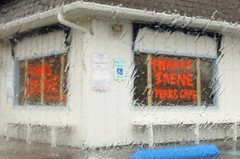A Post-Hurricane Prayer

WIND AND WAVE: A view from the Jersey Shore in the midst of Irene. Photo by Christine A. Scheller.
What does one pray after a hurricane? After calamity, perhaps especially after calamity, we can pray as Jesus taught us. The Lord’s Prayer, which Jesus handed down to the disciples, is traditionally divided into seven petitions. We’ll take our cue from the church mothers and fathers, musing upon each petition in relation to Hurricane Irene.
Hallowed be thy name
One wonders, agonizingly, where was God when Irene struck? Was God sleeping like a tired air traffic controller? Who, precisely, do we take God to be in such pervasive tragedy? As the questions fester, let us recall Psalm 88 — that roughhewn intonation of faith — begins by invoking God’s name, but concludes where many are now: “Trouble surrounds me and darkness is my only companion.”
Thy kingdom come
Irene strikes. Anxiety ensues. We await the arrival of the Red Cross. City agencies and civil sector groups provide support services with incomparable scale. We rightly await their coming. In another sense, however, we long for more. The brute fact of natural disasters compels us to moan — to groan with all of creation — sorrowfully anticipating God’s return, the parousia of Jesus our Christ.
Thy will be done
Most theologians draw some sort of distinction between God’s inviolable will and a more contingent plan. We ask — we plead even — that God’s perfect will be done. With the indignant spirit of Abraham we ask: will not the Judge of All Heaven and Earth do what is right? And with the simple profundity of a country Baptist preacher, we pray the Master’s “Peace be still” in the midst of the storm.
Give us this day our daily bread
We beseech God for daily bread, understanding that God beseeches us — summons us –to provide daily bread for our neighbors in need. Whether the medium is individual charity, congregational and institutional giving, or the public disbursement of disaster assistance, our prayer is same: may the post-Irene provision of bread be proportionate to the need.
Forgive us our sins, as we forgive
One temptation in every storm is to condemn those who stay behind. In our rush to impose conceptual order, we often obscure social disparities—forgetting that some citizens depend on public transportation, that the elderly need assistance, and that inmates, too, need an evacuation plan. Far be it from us to shrug our moral shoulders at those who either cannot or will not adhere to what they hear. If the moral life partly concerns the formation of good habits, and if we, in moments of lesser consequence, have failed to heed a clear summons or two, then we do well to extend the same grace to others. But for the grace of God, there go I.
Lead Us Not into Temptation
Temptation, in part, is the struggle to remember. In lack, to recall God’s provision. In Canaan, to remember Egypt. As the waters of Irene slowly recede, the cares of life set in, and, gradually, what was urgent becomes less important. May we remember the togetherness of strangers serving one another, and hold fast to images of first responders’ sacrificial service. May our memories, upon fingering the jagged edge of Irene, lead us to serve in times of natural disaster.
Deliver Us from Evil
Rev. William Sloane Coffin once remarked, “It is common to say that religion is a crutch. I always respond, ‘What makes you think you don’t have a limp?’ ” With his characteristic wit, Coffin suggests that our human condition is characterized by fragility. When we seek divine deliverance, we shatter the illusion that we are deliverers, that we can extricate ourselves from suffering altogether. Only the man of sorrows, who was tested at every point as we are, yet without sin, can do that. Once the mist of arrogance is removed from our eyes, a newfound freedom emerges to redeem the pain of misfortune and disaster.

